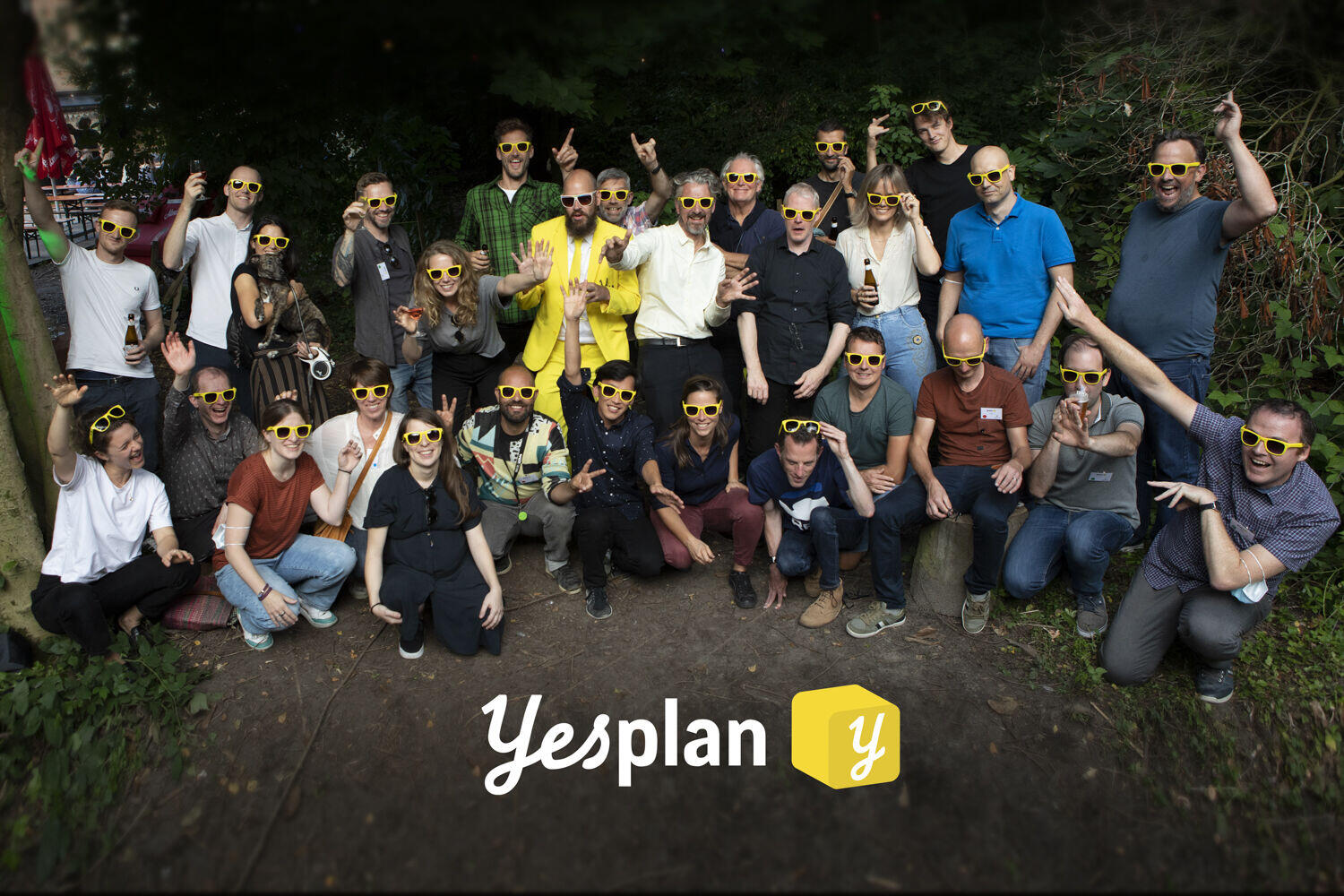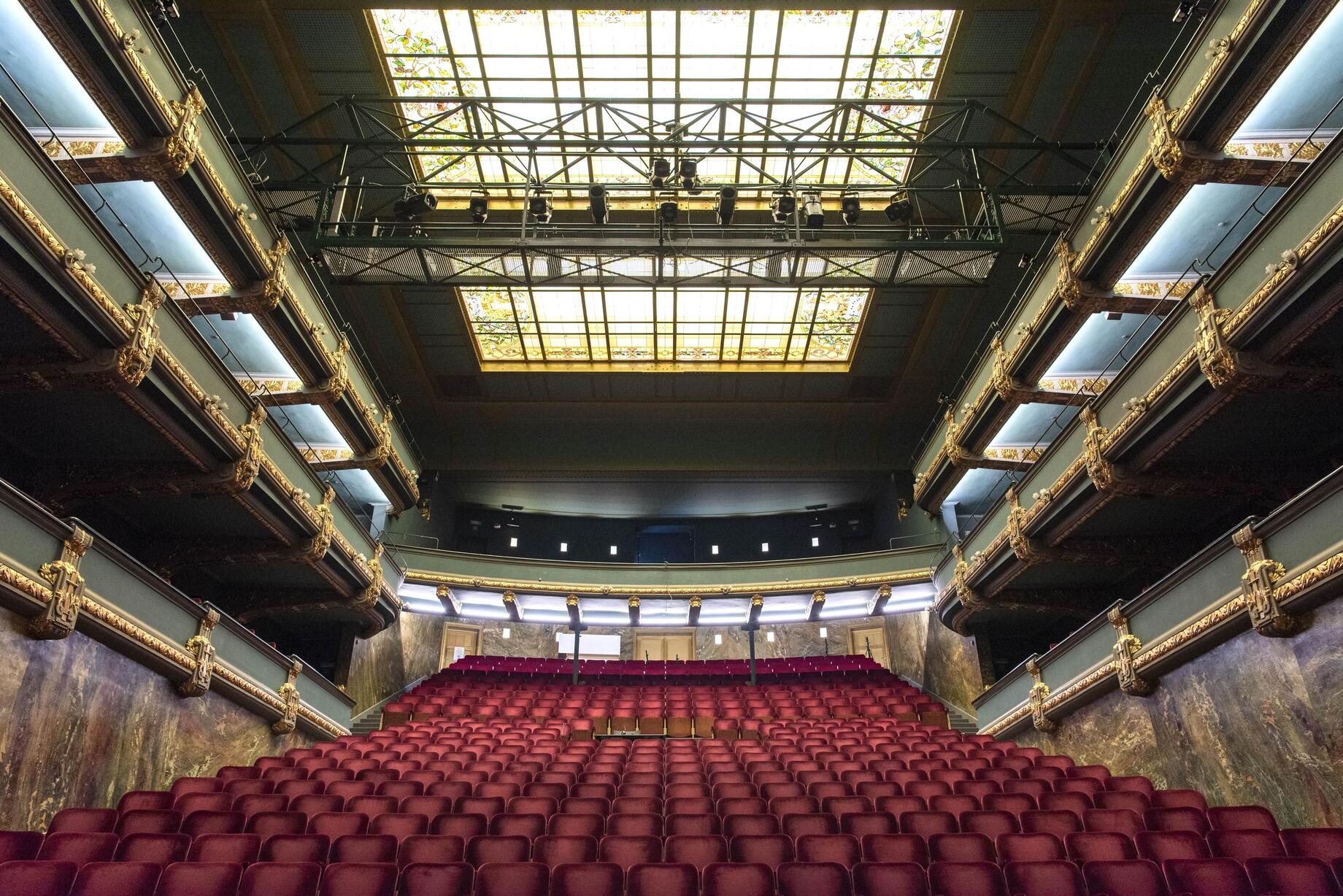Yesplan wishes you full and efficient event calendars for the new year
Yesplan is a start-up born from the arts centre Vooruit - now VierNulVier - and three professors from the VUB.
Their system allows for smarter and faster planning for the cultural sector. Thanks to their experience within the sector, they can now offer a tailor-made solution to more than 400 venues worldwide. Now that the dust of the Covid epidemic has settled somewhat, I went to hear how they experienced the past period and, more importantly, what their future plans are now that they have been taken over by Icelandic Activity Stream.
They also bridge the gap between our cultural sector and the digital Tech scene, which has become so important in Ghent. According to The State of Flanders Startup Ecosystem, a report prepared by Dealroom, Ghent has no fewer than 454 startups, and many fall within the Digitech spearhead. Sure, we can count on a great legacy of companies such as Tele Atlas, Netlog and Combell. But Yesplan can also present some achievements to be proud of. We spoke to CEO Wouter Vermeylen, who told us more about the company's past, present and future.
The growth of the company over the years
- 2007-2008: the concept looms large in the minds of some staff members at Vooruit (now VIERNULVIER).
- 2008-2011: they hone their concept further in 'their playground' at Vooruit
- 2011: thanks to iMinds (now imec), among others, the concept becomes a business. A collaboration develops between the Vooruit arts centre and 3 professors from VUB.
- 2012: expansion into the Netherlands
- 2012-2016: the team continues to work on the stability of the tool, and they become market leaders within Belgium and the Netherlands
- 2016-2022: expansion to French-speaking regions, UK, Scandinavian countries, Iceland and USA (20 countries in the meantime)
Hi Wouter, I am meeting you here at WATT The Firms. Fantastic location! Tell me, what is it, exactly, that Yesplan does?
We manage everything behind the scenes at a cultural house or event centre. For instance, we offer a calendar within our product where all kinds of activities can be scheduled: a show, a presentation, but also a venue maintenance, a dressing room used by the artist or catering. In fact, we support everything involving the event: from booking the staff for the lighting and sound at the venue, to the drinks that need to be ready in the dressing rooms afterwards. In addition, you can also put your contracts in our tool, so that the sales representative can follow up on the status.
We also offer integrations. For example, we instruct the ticketing system on how many tickets can be sold for that day and also from when these sales can start. In exchange, we then get the necessary information to adjust our event where necessary. This gives us valuable information: how many people can we expect, how much turnover can we generate, etc. I don't need to draw you a picture of how devastating it can be for an organiser aiming for 500 attendees when there are only 5 people who've bought tickets. Those insights are invaluable. Let's put it this way: we are very invisible to visitors, but Yesplan sees everything that happens.
Over the years, you have been able to achieve significant growth. How do you approach this internationalisation?
Translating our product is relatively easy. The difficult part is selling it in international markets.
Naturally, other countries use the software in the same way, but there is always a different approach locally. For example, the more northern the market, the more the focus is on profitability. With us, the focus is more on content, as art houses here can still rely on grants from local governments.
There are 2 things that are brilliant about the cultural sector. No, there are many more things that are great in our sector (laughs), but for us, it's mainly about two things:
First, they like to brag about what they're doing in the cultural sector. That's uncommon in other sectors, like petrochemicals or industry, where they work with proprietary processes and where there can be fierce competition. And I use the term 'brag' in the best possible way, by the way. It's because they are rightly proud of what they do and want to share it with everyone, from their area of interest. The cultural proverbial fanfare works very well in that respect (laughs). We, for instance, have to spend very little on marketing and communication. We respond to this by organising a 'Yesplan on Tour', inviting surrounding cultural houses to show what's possible. And they love it, because they can take a look behind the scenes.
Secondly, we are lucky that, as Flanders, we have an excellent reputation internationally. As a result, we can easily join that cultural network. We're actually operating in their slipstream (laughs). Names like Anne Teresa De Keersmaeker, Wim Vandekeybus, Alain Platel, etc. have all paved the way for others in the cultural sector. Moreover, Ghent has great charisma! We could turn to the people at VIERNULVIER and the Bijloke, to ask who they work with abroad. People from Ontroerend Goed, for example, also have a huge network. Apart from that cultural network, we could also fall back on Flanders Invest & Trade. For example, they made sure we could organise a 'Yesplan on Tour' at the Belgian embassy in London, where we could then invite people from the local cultural sector and show what we were doing. Without them, we would never have gained a foothold there.
-
We respond to this by organising a 'Yesplan on Tour', inviting surrounding cultural houses to show what's possible. And they love it, because they can take a look behind the scenes.
What are your plans for the future?
Well, in 2021, after 10 years, there was a need for another round of capital to finance - among other things - expansion into the United States. However, VIERNULVIER indicated that, as a NPO, they can support a start-up, but do not have the ambition to finance an IT-related scale-up. In addition, PMV (Participatiemaatschappij Vlaanderen) also indicated that, as a VC (venture capitalist), they wanted an exit after 10 years. So thus began my search for new investors.
And they are not always easy to find, of course. There also has to be that click.
Indeed, there had to be a genuine interest in our product. Moreover, they had to be able and willing to buy out the existing shareholders and also invest extra to enable further growth. So it was a rather long search. VOKA supported me in this. Thanks to our connections in Scandinavia, we then came into contact with Activity Stream. Very similar in terms of company to ours as they also only work for the cultural sector, but their product is complementary to Yesplan. The CEO, Einar Saevarsson, then contacted us because he saw that we had two different products, but shared the same target audience. Moreover, they were looking for entry into Europe, where we were already active, and we were looking for entry into the US, where they were already active. So it turned out to be a win-win situation. And all that with a start from VIERNULVIER in Ghent (laughs).
So you see: waiting pays off.
Timing is everything. And so you see, COVID-19 was actually a very big windfall for us.
You have to explain that... I thought the cultural sector was hit hard by COVID-19?
Yes, people don't understand that (laughs). But it was a confluence of circumstances. First, people noticed that it is an administrative hell to start rescheduling all the cancelled events and notifying people without the right software. Imagine having 300 performances scheduled and all the info about them being in separate Excel files. Where do you begin? Cultural houses that had Yesplan at the time could just drag those shows and the system behind it did the rest: staff for light and sound, catering, visitors, etc. were all notified.
Secondly, cultural organisations still received adequate funding and couldn't spend their money on new shows. Finally, our product is not that expensive, so they could start working with our platform in the meantime. Everything was down, so they also had time to implement a new system.
Mind you, in the beginning, we also assumed the worst and put everything 'on hold': no new projects, people on temporary unemployment, etc. But after 3 to 4 months, we noticed an increase in the demand and started working again.
To be clear, the impact of COVID-19 within the industry has been disastrous. Today, we see a gigantic workload, while many cultural houses had to let men go during that period. There has been a veritable brain drain of a lot of knowledge, to other sectors. Many of those people did not return either when it was allowed again. We see that many organisations are looking for people with the right qualifications. The workload comes from all the projects that are now being resumed because they were shut down at the time. Add to that the fact that many artists have been very productive during the various lockdowns, and you have an intricate maze of schedules. The past season has been much busier than usual. This only benefits visitors, as people once again find their way to the stages. Still, there was an oversupply, and it was very difficult to fill the venues.
So, I fear the situation is still far from normal. But, if it can be any consolation, it's the same story worldwide.
-
Thanks to our connections in Scandinavia, we then came into contact with Activity Stream (...). So it turned out to be a win-win situation. And all that with a start from VIERNULVIER in Ghent!
Coming back to the fact that your product is not that expensive, can a smaller organisation also use your licences?
Absolutely. We have different types of organisations in our portfolio. I think the smallest has 2 employees and the largest 400. Moreover, we look at the size of the organisation to determine the price, not just the number of employees. For example, just because you're 'only' two does not make the organisation less professional. We make it affordable for any organisation. By the way, if we were to deploy our ERP system in any other sector, we could charge much higher prices. But that's what makes our product so strong: if we can get this sold within the cultural sector - where budgets are low - then we've got a damn good product. We've proven that now, after 10 years.
So why stay connected to the cultural sector?
That was a very conscious decision in 2015. With start-ups nowadays, we often notice that they don't dare to make conscious choices. They want to serve a broad audience, whereas it actually pays off if you select a very specific target audience. That niche market is where you can really excel.
Moreover, we've had invest a lot in our technology, and then you can grow in two ways: either you take the same product to other regions, or you stay within the region and look for other types of customers. With the latter option, chances are you also have to diversify your product and that means an extra investment. We've clearly chosen to grow into other countries with the same product.
One of our product's success factors is our investment in implementation. With ERP software, you always have a very long implementation period. As a result, these processes are also very expensive and budgets are simply not available in this sector. Out of necessity, we therefore did everything we could to ensure that we could grasp the core of the organisation and respond to their needs and requirements in a matter of days. When we started in 2011, we needed 15-20 working days to implement a system for a customer. Now, in 2022, we only need 2 to 5 working days for that. So we try to keep that cost as low as possible.
So you really offer a tailor-made product?
Well, every customer gets the same product. You can actually compare it to a box of Lego bricks. The customer might say he wants a fire station and then when he opens his box the first time, it's all already there. The neighbour wants a house with a long driveway full of trees, but he gets the exact same box. Otherwise, we wouldn't be able to provide optimal service either, should everyone have such a different product. Our 400 customers just use it differently.
-
With start-ups nowadays, we often notice that they don't dare to make conscious choices. They want to serve a broad audience, whereas it actually pays off if you select a very specific target audience. That niche market is where you can really excel.
For that service, you can count on your employees. How difficult or easy is it to find new employees today?
Today, we've got about 35 employees. Thanks to our good connection with VUB, we can count on a steady influx of talented people. Because we actually work with very exotic software (laughs), not many IT graduates can handle it. We work with Smalltalk, which is only used at Mediagenix, in Flanders, next to our company. We obviously need different profiles: software engineers, devops, etc. and we really notice that it's getting harder and harder to fill vacancies. Our latest hire, for example, is someone from Cuba who did research at VUB and will now settle here in Ghent. We really need that international talent.
And the environment doesn't make it easy either, of course. There is such a big tech scene here in Ghent, which is great for learning from each other, but companies do compete for the same profiles, of course. Our criterion now is: if they're more or less in the same time zone and the click is there, then it's OK (laughs).
Finally, this question: what would you recommend to Ghent entrepreneurs?
I would recommend many things (laughs). But then I mainly think the following: a mediocre product with a mediocre team is okay. But with a great team, you can also turn it into a great product.
In other words, it's much better to make sure you've got a good team than to focus blindly on your product. Because of course, it's easier, as a start-up, to hire people fresh out of college or university rather than a more expensive profile. But sometimes, with that person with those higher requirements, you're 3 times more than a newly graduated employee. Especially in the beginning, investing sufficiently in your employees is crucial. And feel free to hire people who are more intelligent than you! As a business leader, your job is not to be the smartest in everything you do, but to make sure everyone knows what to do.
Discover Invest in Ghent
Eager to start a business in Ghent, just like Wouter? The team Invest in Ghent is ready to help you start or scale your business in Ghent through our expert local guidance and introduction, so your business can grow even further.




